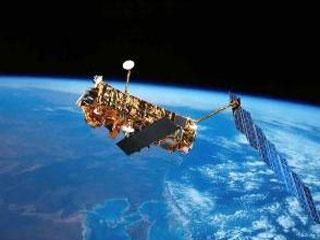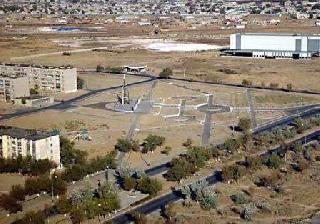
Artistic representation of ‘PakSat-1R’satellite
ISLAMABAD (PTI): Pakistan's PakSat-1R geostationary communications satellite was launched into space on Thursday by a Chinese rocket from a site in southwest China.
The satellite was carried into space by a Long March-3B rocket from Xichang Satellite Launch Center in Sichuan province late on Thursday.
PakSat-1R was built by scientists and engineers from Pakistan's Space and Upper Atmosphere Research Commission with technical guidance and financial aid from China National Space Administration.
The launch was witnessed by a group of Pakistani officials, including Strategic Plans Division chief Lt Gen (retired) Khalid Ahmed Kidwai, Foreign Secretary Salman Bashir, Pakistan's Ambassador to China Masood Khan and SUPARCO chief Maj Gen Ahmed Bilal.
The satellite carries a communication payload to facilitate the launch of a several new services, including broadband Internet, digital television broadcasts, remote and rural telephony, emergency communications, tele-education and tele-medicine.
PakSat-1R is expected to have a lifespan of 15 years and will be operated from SUPARCO’s satellite ground stations in Lahore and Karachi.
Speaking after the launch, SPD chief Kidwai expressed his gratitude to the Chinese government for supporting Pakistan in space technology.
He said cooperation between the two countries in space technology will continue to grow in future, enabling Pakistan to reap rich benefits.
Foreign Secretary Bashir said, "The successful launch is yet another shining illustration of the time-tested friendship between Pakistan and China and has ushered in a new era of cooperation in space technology between the two countries."
The launch marked the "next step in taking forward Pakistan's Space Programme 2040", Bashir said.
PakSat-1R was designed by China Academy of Space Technology, a subsidiary of China Aerospace Science and Technology Corporation.
The satellite has 30 transponders, including 12 C-band and 18 Ku-band transponders.
It has communications antennas covering South Asia, the Middle East, East Africa and part of Western Europe.
The agreement for launching the satellite was signed in October 2008, when President Asif Ali Zardari visited China.
Chinese officials noted that the launch came ahead of Pakistan's 65th Independence Day on August 14 and coincided with the celebration of the 60th anniversary of the establishment of diplomatic relations between the two countries.
President Asif Ali Zardari and Prime Minister Yousuf Raza Gilani felicitated the country on the successful launch of PakSat-1R.
In a message, they described the launch as an historic occasion as it placed Pakistan in the league of select countries that operate national communications satellites.
Zardari said the event was "a milestone in our journey on the road to progress".
The two leaders received the information of the successful launch of the satellite while they were holding a meeting in the presidency.
They said the launch of PakSat-1R from Chinese territory "demonstrated once again the deep-rooted and strategic ties between the two countries".
These ties "have grown from strength to strength and are a factor of stability in the region", they said.
 Previous Article
Previous Article Next Article
Next Article













The Indian Air Force, in its flight trials evaluation report submitted before the Defence Ministry l..
view articleAn insight into the Medium Multi-Role Combat Aircraft competition...
view articleSky enthusiasts can now spot the International Space Station (ISS) commanded by Indian-American astr..
view article